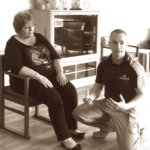The Globe and Mail is reporting about a judge who has asked for mandatory secure units in care homes which look after people with dementia who present with violent behaviour.
Speaking in Canada, the judge said that the number of people who suffer from dementia-related cognitive impairment is rising sharply and that there must be a corresponding increase in special areas for residents who may lash out.
The judge was writing an inquest report on the death of a man in a care home due to a physical assault from another resident, who had a documented history of serious violence. The violent resident had attacked his wife on numerous occasions, necessitating his removal to a remand facility and eventually to a care home.
Once admitted to the care home, the resident continued to behave violently toward staff and other residents at the facility. This behaviour culminated in a fatal violent assault on the deceased man, who died after falling back and hitting his head on the floor during an assault on him.
The report cites a shortage of beds for high-risk residents, which is expected to become a consistent problem as the number of such residents continues to rise.
“Evidence is clear that the queue for these behavioural units can be as much as one year in length. This is not acceptable,” Justice Chartier wrote.
The report made a number of recommendations, including:
Every personal-care home in the Winnipeg Regional Health Authority’s area have a special, secure unit to handle violent patients.
The number of available beds should be increased so that the waiting period does not exceed 60 days.
Increased staff training and new safety protocols at personal-care homes to ensure violent patients are fully monitored and prevented from harming others.
ISSUES:
1) Some – a limited number – of older people with dementia do present with and are capable of serious physical violence and can assault either staff or residents to their injury, even to the extent of life-changing injury or fatality. Administrators ignore this unsavoury but well-established fact at their peril.
2) Admissions policies in care homes need to be rigourous, based on realistic and pragmatic assessments of risk, and then put into operational practice by care home managers so that they make the easier ‘difficult decision‘ (not admitting a resident) rather then making the harder and much more intrusive decision to remove the resident after two weeks of trying to have them “settle in. If the environment, staff training and resident-mix do not fit the resident…no amount of “settling in” will fix the poor admission decision. In the meantime, bad things can happen
3) A history of violence is the surest predictor of future violence risk. This lesson is learned, ignored, then learned again so terribly often in our care of vulnerable people that we continually expose innocent citizens to risks which in reality should be patently obvious to those tasked with making violence-risk decisions. There may be a dearth of good violence risk-management training which is precipitating this ongoing series of tragedies.
4) Staff training needs must be properly investigated and assessed by managers who under stand the above risks and then the training should be fulfilled by competent and qualified trainers who understand completely the impact of dementia on a person’s perceptions, behaviour and stress.
—————————————
Gerard O’Dea is a conflict management, personal safety and physical interventions training consultant. He is the training director for Dynamis, a specialist provider of personal safety and violence management programmes and the European Adviser for ‘Verbal Defense and Influence’, a global programme which addresses the spectrum of human conflict. www.dynamis.training



